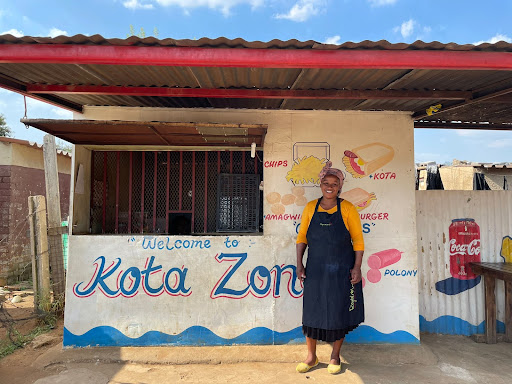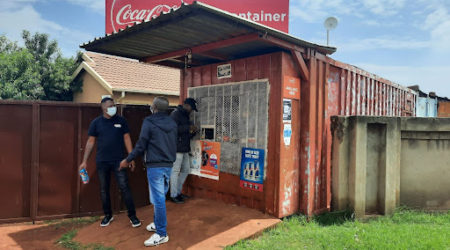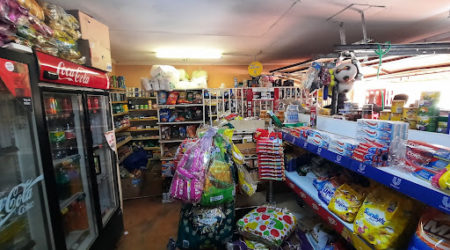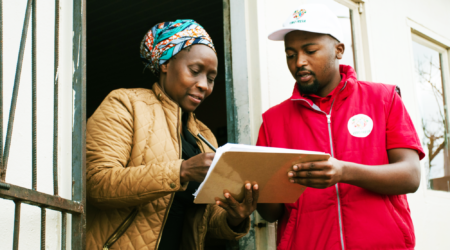Digital innovations to build the resilience of South African spazas: The case of Yebo Fresh and Vuleka

Phindi runs a fast food business in a township in Ekurhuleni, Gauteng. She was inspired to start her own business after working in a similar enterprise run by a black African woman like herself. “It is from that experience that I realized I can also do it.” Phindi has successfully run her business for the last three years and employs two women to assist her. Her business is located on a main road with lots of foot traffic leading to the town center and a nearby school, an ideal spot for receiving business from passersby. To sustain the volumes, she usually ventures out to source supplies two to three times a week. She splits her orders to match her cash flow. Her usual weekly basket consists of 12 kgs of flour, 20 liters of palm oil, and 36 liters of cooldrink, among other things. She does not have private transport, so she has to haul the bulky and heavy goods from the wholesaler to the taxi (public minibus). From where she is dropped off, she has to trek to her business premises, about 1 km out. Each time she spends ZAR14 (USD 0.84) going and ZAR 28 (USD1.68) coming back as she has to pay for an extra seat to accommodate her goods. If she were to hire a delivery vehicle, she would pay ZAR 150 (USD 9) per delivery.
Apart from the high transport costs that eat into her minimal margins, and the time lost, which she would otherwise spend preparing the meals for sale, security is one of her greatest concerns. She fears going out to restock because she becomes an easy target moving around with cash. Just last year, her store was robbed at gunpoint, and one of her employees was shot through her palm despite showing little resistance. The incident left them traumatized and in constant fear of holding cash, let alone going out to shop, as they become conspicuous targets.
Yebo Fresh aims to support businesses like Phindi’s to achieve efficiencies, to overcome stock cash flow and logistical challenges to grow. Since becoming a Yebo Fresh customer, she now leaves her shop only once a week or once in two weeks to purchase her broader basket of goods that goes beyond what Yebo Fresh offers. She hopes that in time Yebo Fresh will expand their basket of goods, thus completely eliminating her travel to source supplies. Not only are the goods delivered to her doorstep, but she is also able to order beyond her cashflow limits thanks to the Yebo Fresh Stock Boost, a buy-now-pay later program developed through the Digital Spazas Program with BFA Global in partnership with JPMC
Apart from providing convenience, time, and cost savings, she is also grateful for the peace of mind. She perceives the risk of being hijacked or robbed while in transit as being lower since Yebo Fresh handles the delivery of goods and cash. Her sentiments were shared by other Yebo Fresh customers we interviewed:
Deliveries are safer in this world of hijackings.”
“[The service] is convenient and the agent is easy to work with.”
“I saved a lot on transport they have reasonable prices on stock.”
How does Yebo Fresh achieve such results?
Yebo fresh offers a tech-powered order-to-delivery solution to small businesses in South Africa’s townships in Gauteng and Cape Town. Its network of local agents recruit and visit spazas, fast food sellers like Phindi, and other small businesses to capture orders via Yebo Fresh’s mobile technology. These are delivered to their doorstep within 24 hours, and no delivery cost is charged for orders above ZAR 1,000 (USD 60). By aggregating demand, Yebo Fresh has over time been able to unlock better buying terms from manufacturers and wholesalers, translating into better prices and other promotional deals for a variety of goods.
How has the Digital Spazas Program bolstered order-to-delivery solutions for Spazas?
The Digital Spazas Program worked with two innovators, Yebo Fresh and Vuleka, with similar goals related to digitizing the ordering and delivery of goods to township businesses. They are both anchored to creating efficiencies for micro and small enterprises (MSEs) while also setting themselves up for synergetic partnerships with financial service providers and manufacturers or distributors interested in harnessing the untapped and sizeable opportunities lying in the informal sector and particularly township businesses. By providing digital rails for MSEs, these innovators could be key hubs for providing visibility into the demand patterns of township MSEs and linkages to expand into the current opaque environment. The digital spazas program was Yebo Fresh’s entry point for serving spazas and further bolstered both Vuleka and Yebo Fresh to expand their reach and create more value for spazas.
Initially, Yebo Fresh started out as an e-commerce service targeting households and institutions such as NGOs in South Africa’s townships. It is through the call for applications for digital spazas program that Yebo Fresh first realized the opportunity to expand into serving spazas and other township micro and small businesses (MSEs). Yebo Fresh utilized the funding provided by the program, in addition to its own resources, to put the proposal they conceived for this project into action. As a result, Yebo Fresh has grown its MSE base to include 5000+ township businesses, 90% of which are spazas, contributing to 50-60% of its revenue base.
The first phase of the digital spazas program focused on optimizing the respective tech capabilities of each of the innovators to enable them to scale their offerings more efficiently. The BFA Global team supported the Vuleka team in launching a prototype smartphone app for its agents to handle sales, order fulfillment, and customer service. The team also supported the Yebo Fresh team in designing and validating a WhatsApp engagement process for spazas. Both entities are incorporating the designs in their ongoing platform revamps set to be finalized in Q4 of 2022. Vuleka’s revamp was funded through R2,000,000 convertible debt from IDF Capital, an investor relationship fostered by this program.
As we implemented the first phase, the need for a buy-now-pay-later option for purchasing stock became apparent. Both innovators were struggling with high levels of returns due to cashflow constraints at the spaza level. For instance, Yebo Fresh noted that their strict policy of payment on or before delivery did not work for a significant number of spazas which resulted in high return levels, which was costly for them. At the same time, some of the most successful agents were already informally offering repayment terms to spazas to avoid losing sales. Stock would have to be returned to dispatch in the event that spaza owners did not have cash on hand to make the payment upon delivery. However, the informal and arbitrary nature in which repayment terms were being offered meant that the entities were not properly tracking the provision to learn and optimize the solution for the benefit of the innovators and the spazas alike.
This presented an opportunity for the program to facilitate a pilot at a relative scale to provide data and lessons to build upon with the aim of
(i) removing cash flow constraints for Spaza shops owners, enabling their growth through increased sales
(ii) reducing costs associated with returns to the benefit of the innovators
Through a guarantee facility, support was provided to hire dedicated resources, technical support to build the product value proposition, and set up data and operational processes to effectively offer stock on terms to more spazas that qualify.
The pilot has since surpassed all set targets and is being scaled more aggressively. The Yebo Fresh offering, under the name Stock Boost, had about 300 spazas signing up during the 5-month pilot with default rates of less than one percent (1%). The value of stock provided via the stock on terms totaled over ZAR 2,000,000 (about USD 115,000). Post-pilot, and by the beginning of November 2022, the number of spazas that had signed up grew by 50%. The value of stock provided via the product more than doubled to ZAR 5,578,689 (USD 321,206). Vuleka is also seeing encouraging uptake of up to 10% of its client base, with minimal repayment challenges. By the beginning of November 2022, Vuleka had provided stock on terms valued at ZAR 240,000 (USD 14,000). Both innovators noted significant improvement in customer loyalty and increased basket sizes among spazas accessing stock on terms and are continuing to scale the offering (See final blog on credit). As it stands, Yebo fresh has already revamped its digital platform to accommodate the offering and related processes.
JPMC and BFA Global launched Digital Spazas, a program focused on strengthening the financial health and resilience of ‘spazas,’ informal retailers in the South African townships, and helping them digitize to be more resilient in the face of future crises. The program set out to demonstrate that digitally-enabled MSEs are better equipped to survive and bounce back from unexpected shocks, better suited to grow through higher sales and operational efficiencies, and can ultimately access an expanding suite of financial services.
The Digital Spazas program partnered with three South African innovators – A2Pay, Vuleka, and Yebo Fresh – with boots on the ground and products already serving spazas in the township economy. For two years, BFA Global worked with these innovators to design and deploy new digital and digitally-enabled solutions that help spazas access credit to restock their shops and continue to sell through the pandemic, access credit for store expansion or asset purchase, increase their income opportunities, and improve their ability to invest in the long-term needs of their business.



